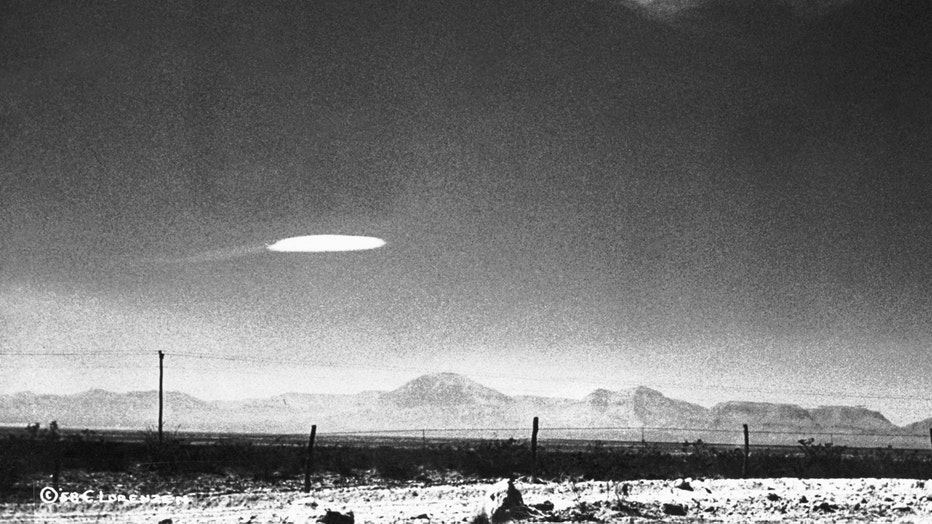Aliens may be living among us disguised as humans, Harvard researchers claim
Harvard scientist: Aliens walking among us
Researchers at Harvard University and Montana Technological University speculate that an unidentified, technologically advanced population could be living among humans secretly on Earth. Nick Pope, who ran the British government's UFO project adds more context to the findings.
A paper written by research scientists at Harvard University suggests aliens could be living underground or on the moon, or even walking among us and posing as humans.
The paper, which has not been peer-reviewed, looks at a newer, "unconventional" theory called "cryptoterrestrial" hypothesis. The paper was written by researchers with Harvard’s Human Flourishing Program, but a note at the top of the report called it a "speculative thought piece" and emphasized it’s not affiliated with the program at Harvard.
"We would also like to emphasize that we believe this hypothesis to be in all likelihood false, but nevertheless believe it still merits scientific investigation," the paper states.
What is the cryptoterrestrial hypothesis?
According to the paper, scientific discussion around unidentified aerial phenomena (UAP), the official government term for UFOs, has been dominated by two main classifications: human technology (conventional terrestrial origin) or extraterrestrial origin (civilizations arriving from somewhere other than Earth).
Researchers have since considered a more unorthodox set of theories, the "ultraterrestrial" hypothesis. Included in this subset of theories is the cryptoterrestrial hypothesis, which explores the possibility of non-human intelligence living among us, either concealed underground, underwater or disguising themselves as humans.
"First, it is increasingly apparent that UAP are not only aerial but can also move underwater in ways that – per their airborne counterparts – defy explanation," the paper states.
The authors cite retired Air Force Maj. David Grusch and retired Navy Rear Adm. Tim Gallaudet, who have argued there’s a lost list of strange occurrences underwater – "acting in ways that surpass human technology, and even challenge scientific understanding of what is possible underwater."
The researchers also point to the "empirical mystery" around UAP sightings often involving orbs that appear to enter or exit potential underground access points, like volcanoes.
"Although this idea is likely to be regarded sceptically by most scientists, such is the nature of some UAP that we argue this possibility should not be summarily dismissed, and instead deserves genuine consideration in a spirit of epistemic humility and openness," wrote the authors, who include two Harvard researchers and a biological anthropology professor from Montana Technological University.

A UFO variety was photographed when it hovered for fifteen minutes near Holloman Air Development Center in New Mexico. The object was photographed by a government employee and was released by the Aerial Phenomena Research Organization after careful s
Nick Pope, who ran the British government’s UFO program, told Fox News Digital he sees the paper more as a "thought experiment" rather than true scientific research.
"Just putting some ideas out there in a way to try and break away from this rather binary ‘either it’s aliens or it's just a misidentification,'" Pope told Fox News Digital. "They're not claiming to have found any evidence of this, but they're trying to kickstart a debate about this, not just with the public but inside science and academica, which has traditionally been very stuffy and skeptical about all this."
What does the government say about aliens?
Pentagon report: No evidence of Aliens
A Pentagon study released Friday that examined reported sightings of UFOs over nearly the last century found no evidence of aliens or extraterrestrial intelligence. Dr. Avi Loeb at Harvard University joined LiveNOW from FOX's Josh Breslow to break down the findings.
The Pentagon denies having any evidence of extraterrestrial life on Earth.
A Pentagon study released in March examined reported sightings of UFOs over nearly the last century found no evidence of aliens or extraterrestrial intelligence. The Defense Department's All-domain Anomaly Resolution Office reviewed nearly 80 years of reports on government offices and special access programs related to UAP.
RELATED: Pentagon UFO report finds no signs of alien life
In July 2023, Grusch, the retired Air Force major, testified publicly before a congressional committee, claiming the U.S. has concealed what he called a "multi-decade" program to collect and reverse-engineer UAP.
RELATED: Whistleblower claims US is concealing program that captures UFOs
Part of what the U.S. has recovered, Grusch testified, were non-human "biologics," which he said he had not seen but had learned about from "people with direct knowledge of the program."
The Pentagon denied his claims; Dr. Sean Kirkpatrick, the Pentagon official who led efforts to centralize UFO investigations, even called them insulting. Still, Grusch’s testimony energized believers in extraterrestrial life and produced headlines around the world.
RELATED: Here's what the Pentagon's former UFO hunter learned on the job
Kirkpatrick said he and the Pentagon "painstakingly" put together a team to create a science-based strategy of investigating UAP, but conspiracy theorists – and some members of Congress – consistently disrupted their work.

